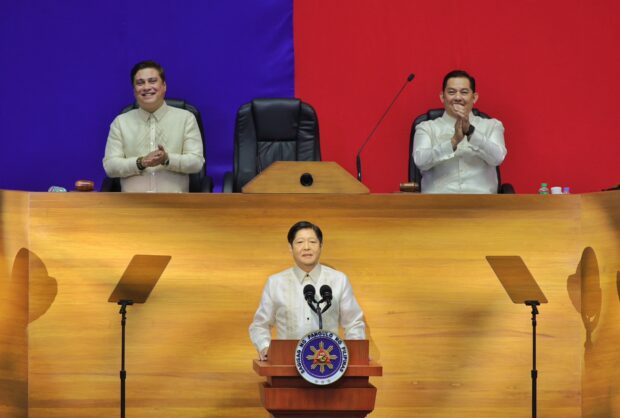
SECOND SONA: Senate President Juan Miguel “Migz” F. Zubiri and House of Representatives Speaker Martin Romualdez clap as President Ferdinand Marcos Jr. delivers his second State of the Nation Address at the Batasan Pambansa in Quezon City, on Monday, July 24, 2023. (Senate PRIB photos)
MANILA, Philippines —President Ferdinand Marcos Jr.’s move to highlight and prioritize infrastructure projects in his second State of the Nation Address (Sona) is important in ensuring economic recovery after the COVID-19 pandemic, Surigao del Sur 1st District Rep. Romeo Momo Sr. said on Wednesday.
Momo, chairperson of the House Committee on public works and highways, said in a statement that big-ticket infrastructure projects would serve as a catalyst for progress especially after the country’s economy was battered by the health crisis.
Marcos made mention of several big-ticket projects in his Sona, like the proposed 1,200-kilometer Luzon Spine Expressway Network Program, the Mega-Bridge Program, and the completion of over 4,000 kilometers of roads and around 500 bridges across the country.
“I have been calling for more big-ticket infrastructure projects since I was a party-list representative. It is always my belief that these projects would serve as a catalyst for economic recovery in this post-pandemic Philippines,” Momo said.
“I welcome the President’s proclamation of focusing on improving our railways, expressways, and bridges, but most importantly, his push for an agency to manage our scarce water resources. That has always been our priority,” he added.
Momo, who is one of the authors of the proposed 30-Year National Infrastructure Program (NIP) — which was approved by the House on third reading last May 22 — noted that the President’s push for a higher motor vehicle road user’s tax is important since revenues from this initiative would be used for road projects.
READ: 30-year National Infrastructure Program bill hurdles House on 3rd reading
The proposal was approved by the House Committee on ways and means on Tuesday, just a day after the session resumed and Marcos delivered his Sona.
READ: House committee approves bill hiking road users’ tax
The lawmaker also thanked Marcos for giving priority to other infrastructure-related projects including a government agency tasked with managing water, since it would help the country cope with dry seasons where water often becomes scarce.
“It is truly heartening to hear President Marcos’ very clear vision of achieving a strong economy—and how building and improving our infrastructure could lead to it—and reawakening our progress as a nation, and this can only be realized with the President’s resolve to weed out corruption and corrupt individuals in the government service,” he said.
“I join the President in his call for a whole-of-nation approach, for a coordinated response to the challenges we face as a nation and society. Only by working together and setting aside our differences can we achieve our common goals of a prosperous Philippines,” he added.
Marcos’ predecessor, former president Rodrigo Duterte, embarked on an ambitious infrastructure drive over his term, labeled as Build, Build, Build. The incumbent President assured the public as early as his first Sona that this program would be continued, and improve the implementation of the infrastructure projects.
READ: Bongbong Marcos to continue Duterte’s infrastructure program
Last March 2023, the National Economic and Development Authority (Neda) Board approved 194 high-impact priority projects worth P9 trillion — including the rehabilitation of the decades-old Ninoy Aquino International Airport (Naia).
Socioeconomic Planning Secretary Arsenio Balisacan said of the 194 infrastructure flagship projects, 123 are new items — indicating that only 71 were carried over from the previous administrations, including the ongoing Metro Manila Subway project under former President Rodrigo Duterte and the North-South Commuter Railway venture under then President Benigno S. Aquino III.
READ: ‘Build Better More’ sets 194 projects worth P9 trillion
However, opposition figures have complained about the slow pace of projects under the Department of Public Works and Highways (DPWH). In a Senate hearing last October 2022, Minority leader and Senator Koko Pimentel asked DPWH why it would not use Marcos’ other initials — FM — in place of BBM or Build Better More.
Pimentel said that the DPWH’s maxim should be “Finish More” or FM, to ensure that the projects are being utilized by the public.
“Instead of ito ngang Build Better More which are the initials of our President, pwede naman nating gamitin ‘FM’ eh initial din naman niya ‘yan, pero ang meaning ng FM para sakin ‘Finish More’,” Pimentel said.
(Instead of this Build Better More which are the initials of our President, maybe we can use ‘FM’ since it’s also his initials, but for me the meaning of FM is ‘Finish More’.)